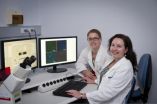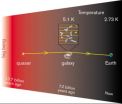(Press-News.org) Melbourne researchers have discovered that the death of immune system cells is an important safeguard against the development of diseases such as type 1 diabetes, rheumatoid arthritis and lupus, which occur when the immune system attacks the body's own tissues.
The finding suggests that these so-called autoimmune diseases could be treated with existing medications that force long-lived immune system cells to die.
In the development of the immune system, some cells are produced that have the potential to attack the body's own tissues, causing autoimmune disease. The death of these 'self-reactive' immune cells through a process called apoptosis is an important safeguard against autoimmune disease.
But Dr Kylie Mason, Dr Lorraine O'Reilly, Dr Daniel Gray, Professor Andreas Strasser and Professor David Huang from the Walter and Eliza Hall Institute, and Professor Paul Waring from the University of Melbourne have discovered that when immune cells lack two related proteins, called Bax and Bak, the cells can attack many healthy tissues, causing severe autoimmune disease. The research is published online today in the journal Proceedings of the National Academy of Sciences.
Bax and Bak are members of the 'Bcl-2 protein family', a large group of proteins that control cell death. Dr O'Reilly said it was thought that Bax and Bak acted like an irreversible switch in cells, determining when cells die by apoptosis. In healthy cells, Bax and Bak are in an 'inactive' form, but when cells are under stress or receive external signals instructing them to die, Bax and Bak switch into an 'active' form that starts the destruction of the cell by apoptosis. Without Bax and Bak, cells are highly protected against apoptosis.
Dr O'Reilly said that some immune cells that lacked the proteins Bax and Bak were able to attack healthy tissues in many organs of the body. "Normally, these 'self-reactive' immune cells are deleted during development," she said. "In the absence of Bax and Bak, enough self-reactive cells survive development to persist in the body and cause autoimmune disease in organs such as the kidneys (glomerulonephritis), similar to what is seen in the most severe form of lupus.
"Our findings confirm that defective apoptosis of immune cells can cause autoimmune disease, and that Bax and Bak are important determinants of immune cell death. We were also interested to see that, in our model, loss of Bak on its own was sufficient to cause autoimmune disease, albeit to a lesser extent than losing both Bak and Bax. This supports a recent discovery that humans with mutations in the BAK gene are predisposed to certain autoimmune diseases."
The research provides hope for people with autoimmune diseases as Bax and Bak activity can be triggered by a new class of potential anti-cancer agents, called BH3-mimetics, which are currently in clinical trials for certain types of leukaemia in Melbourne, Dr O'Reilly said. "Our findings suggest that BH3-mimetics might be an exciting new option for treatment for autoimmune conditions, by activating Bax and Bak and making the self-reactive immune cells which are causing the autoimmune disease to die," she said.
INFORMATION:
The research was supported by the Australian National Health and Medical Research Council, the US Leukemia and Lymphoma Society, the US National Institutes of Health, the Association for International Cancer Research, the Victorian Cancer Agency, the Australian Cancer Research Foundation, the Sylvia and Charles Viertel Charitable Foundation, the Leukaemia Foundation of Australia and the Victorian Government.
Immune cell death defects linked to autoimmune diseases
2013-01-23
ELSE PRESS RELEASES FROM THIS DATE:
CSIRO telescope takes temperature of Universe
2013-01-23
Astronomers using a CSIRO radio telescope have taken the Universe's temperature, and have found that it has cooled down just the way the Big Bang theory predicts.
Using the CSIRO Australia Telescope Compact Array near Narrabri, NSW, an international team from Sweden, France, Germany and Australia has measured how warm the Universe was when it was half its current age.
"This is the most precise measurement ever made of how the Universe has cooled down during its 13.77 billion year history," said Dr Robert Braun, Chief Scientist at CSIRO Astronomy and Space Science.
Because ...
Studies provide insights into inherited causes of autism
2013-01-23
The most consistent finding of autism research lies in the revelation that the disorders are incredibly complex. Two new studies in the January 23 issue of the Cell Press journal Neuron that add to the growing appreciation of this complexity focus on identifying inherited genetic mutations linked with autism spectrum disorders. The mutations—which are distinct from the spontaneous mutations that have been the focus of previous studies—may provide valuable insights into the causes of autism.
"It's long been known that autism is a heritable condition and that some cases ...
New brain circuit sheds light on development of voluntary movements
2013-01-23
DURHAM, N.C. – All parents know the infant milestones: turning over, learning to crawl, standing, and taking that first unassisted step. Achieving each accomplishment presumably requires the formation of new connections among subsets of the billions of nerve cells in the infant's brain. But how, when and where those connections form has been a mystery.
Now researchers at Duke Medicine have begun to find answers. In a study reported Jan. 23, 2013, in the scientific journal Neuron, the research team describes the entire network of brain cells that are connected to specific ...
Whole-exome sequencing identifies inherited mutations in autism
2013-01-23
Boston, Mass. - While autism clearly runs in some families, few inherited genetic causes have been found. A major reason is that these causes are so varied that it's hard to find enough people with a given mutation to establish a clear pattern. Researchers at Boston Children's Hospital have pinpointed several inherited mutations—among the first to be identified—through an unusual approach: using whole-exome sequencing to study large Middle Eastern families with autism.
The study, published in the January 23 issue of the journal Neuron, also found evidence for some of ...
Setting the dark on fire
2013-01-23
In space, dense clouds of cosmic gas and dust are the birthplaces of new stars. In visible light, this dust is dark and obscuring, hiding the stars behind it. So much so that, when astronomer William Herschel observed one such cloud in the constellation of Scorpius in 1774, he thought it was a region empty of stars and is said to have exclaimed, "Truly there is a hole in the sky here!" [1]
In order to better understand star formation, astronomers need telescopes that can observe at longer wavelengths, such as the submillimetre range, in which the dark dust grains shine ...
Researchers design a new imaging technique for identifying the age and sex of a corpse
2013-01-23
Researchers at the University of Granada, Spain, have designed a new computing system that determines the age and sex of a corpse with a reliability of 95%. This system is based on free software called Image and a free DICOM displayer called K-Pacs. This state-of-the-art system is very different from the traditional macroscopy systems used to evaluate the osteoarticular features of a corpse, and it is much faster and user-friendly.
The author of this study is Manuel López Alcaraz, a researcher at the Forensic Anthropology Laboratory of the University of Granada, in collaboration ...
Astrocytes identified as target for new depression therapy
2013-01-23
BOSTON (January 23, 2013) — Neuroscience researchers from Tufts University have found that our star-shaped brain cells, called astrocytes, may be responsible for the rapid improvement in mood in depressed patients after acute sleep deprivation. This in vivo study, published in the current issue of Translational Psychiatry, identified how astrocytes regulate a neurotransmitter involved in sleep. The researchers report that the findings may help lead to the development of effective and fast-acting drugs to treat depression, particularly in psychiatric emergencies.
Drugs ...
Type 1 diabetes in urban children skyrockets, increasing by 70 percent in children under age 5
2013-01-23
Over the past two decades, the incidence of type 1 diabetes in very young children under age 5 has increased by 70 percent in the city of Philadelphia, according to research from a University of Pennsylvania School of Nursing researcher who currently maintains the only US registry of diabetes in children that has collected data continuously since 1985.
In a far-reaching study in the current issue of Diabetes Care, researchers led by nursing professor Terri H. Lipman, PhD, RN found that the overall incidence of Type 1 diabetes in children in Philadelphia has increased ...
Forcing choice may hamper decision-making, study finds
2013-01-23
Constraining choice isn't necessarily a good thing when it comes to managers' problem-solving, according to a new Canadian study.
Managers tend to pick higher-risk options when forced to choose between competing alternatives to complex situations, according to researchers from the University of Guelph and University of Waterloo whose study was published recently in the Journal of Business Ethics.
But when they're not forced to choose, managers tend to reflect more and solve problems with fewer negative consequences, says the study.
"One of the most powerful tools ...
NIH-developed candidate dengue vaccine shows promise in early-stage trial
2013-01-23
A candidate dengue vaccine developed by scientists at the National Institutes of Health (NIH) has been found to be safe and to stimulate a strong immune response in most vaccine recipients, according to results from an early-stage clinical trial sponsored by the National Institute of Allergy and Infectious Diseases (NIAID), part of the NIH. The trial results were published online on January 17 in the Journal of Infectious Diseases.
Dengue fever, prevalent in many tropical and subtropical regions of the world, is caused by any of four related viruses—DENV-1, DENV-2, DENV-3 ...



